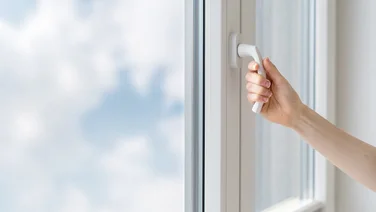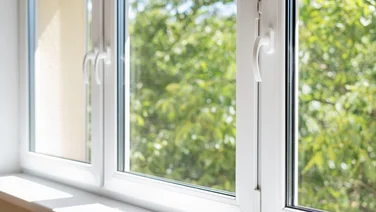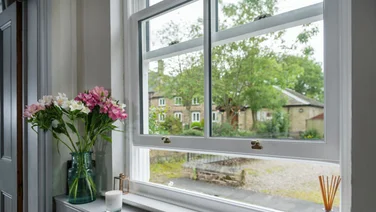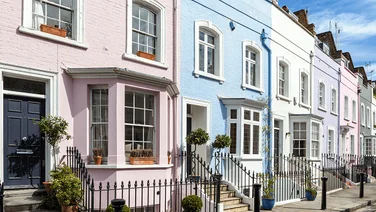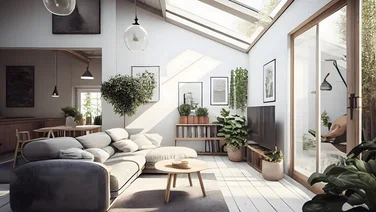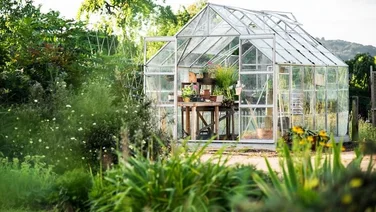We receive a small fee from trusted installers when you request a quote through our site. This helps us keep our content independent, well-researched and up to date – Learn more
- Replacing your windows can cut your heating bills by £140 a year
- New windows will reduce noise, draughts, mould and condensation
- Your home’s value and EPC rating will improve with new double glazing

Replacing your home’s double glazing is a hefty investment, but it pays even bigger dividends including lower energy bills, a more valuable property and a healthier home.
Double glazing costs around £10,000-£15,000 for a three-bedroom house, so it’s not a cheap project. But if your windows are developing problems like condensation and warped frames, replacing them is often the most cost-effective option.
Glazing technology has evolved to give new windows a much longer lifespan, and the best double glazing companies will even recycle your old windows to help cut your costs and shrink your carbon footprint.
In this guide we’ll reveal 10 key benefits of replacing your double glazing, from home security to banishing mould. We’ll also reveal the clues that you need new windows and offer tips on covering the cost.
Ready to look at quotes now? Add a few details to this form, and our hand-picked selection of double glazing companies will be in touch with a tailored estimate.
If you want to know how much new windows might set you back, look at our double glazing cost calculator.
Why should I replace my double glazing?
The best windows do far more than just let light into your home. Here are 10 reasons to fit new double glazing:
1. Your home will feel more comfortable. The sealed unit in a double glazed window is filled with argon gas, which acts as a thermal barrier and helps to keep you warm in winter and cool in summer.
2. Your energy bills will go down. Double glazing can save the average household up to £140 a year on their heating bills, according to the Energy Saving Trust. This saving could be 10% higher now that the summer 2024 price cap has been lifted.
3. Your carbon footprint will be smaller. Keeping more heat inside your home means you use less carbon-based energy to heat it.
4. You’ll hear less noise. The thermal barrier created by a double glazed unit blocks noise as well as trapping heat. If you live near a busy road or airport, new double glazing could make a big difference to your life – and sleep.
5. You’ll protect your home from mould. Old and worn out windows let in draughts and moisture that lead to mould and rot. Replacing your windows solves the problem at source.
6. Your home will be safer. Older patio doors and windows are shockingly easy to break into. Good double glazed windows have sophisticated locks that keep out even the most determined intruders.
7. Your insurance will be cheaper. Your premiums may go down if you can state that your windows and doors use the latest multi-point locking systems.
8. Your home will be worth more. New windows are a quick and dramatic way to improve your home’s appearance and EPC rating, making it more valuable and easier to sell. You can now match double glazed windows to older properties by choosing timber frames and heritage styles such as sash.
9. Your windows will be easier to clean. If you switch from wood single glazed windows to uPVC double glazing, you may be amazed by how much easier they are to keep clean: just wipe the frames with a damp cloth.
10. Your windows will be easier to maintain. Double glazing doesn’t last forever and still needs maintenance, but it’s a world away from trying to maintain single glazed wood windows. New windows largely take care of themselves.
What type of double glazing do you need?
Get startedHow often should double glazing be replaced?
The average double glazed window lasts around 25 years, but a window’s lifespan depends on many things including how well it was installed, how often it’s exposed to wind and rain, and when it was manufactured.
Today’s new double glazed windows will last much longer than windows produced 20 or more years ago. According to glazing giant Anglian, today’s uPVC windows “can last up to 35 years with proper care” while well-maintained wood windows “will last up to 50 years and more”.
So while the best double glazing companies offer guarantees of 10 to 20 years, there’s every chance your windows will last longer than that.
However, don’t assume that just because your windows are less than 20 years old they don’t need replacing. We recommend keeping an eye on them for clues that they need an upgrade.
If you’re looking for installers near you, have a look at our page that looks into the best double glazing companies.
How can I tell if my windows need replacing?
Windows that need replacing don’t always bear obvious signs like a big crack down the middle. Here are a few more subtle clues…
- A draughty home. Hold your hand to your window seals to make sure they’re not the source of the pesky cold air. If you can’t afford new windows, a good installer will replace the seals instead.
- Increased energy bills. If your bills suddenly go up and you can’t work out why, you could be paying for warm air that’s disappearing out the window.
- Condensation between the panes. Water vapour between the panes means the sealed unit has developed an air leak. You may be able to have the sealed unit replaced rather than the whole window.
- Ageing frames. Rotten and cracked window frames lead to further damage inside your home, such as rotting sills and damp brickwork, so get them replaced if you can.
- Water leaks. This will happen when the seal around the frame wears away, and again can lead to damage in your home.
- Cracks in the window or frame. Ageing windows develop chips and gaps in the frame and seal. Even small chips can allow water to seep through and lead to mould and damp.
- Noise doesn’t stop when you close the window. This is a sign that argon gas has escaped from the sealed unit and your windows need replacing.
- Difficulty opening and closing. Sometimes this is down to faulty hardware or a bad installation but it can also develop slowly over the years. If you have cleaned the inside of the frame and tried to adjust the hinges but it still won’t close properly, the frame may be at the end of its life.
How much does it cost to replace double glazing?
Double glazing costs vary depending on the type of windows you want. White uPVC windows are the cheapest while timber is the most expensive.
According to 2024 figures from the Federation of Master Builders, white uPVC casement windows start at around £500 per frame and should last more than 20 years. Aluminium double glazed windows start at £1,000 per frame but can last 45 years. Timber costs from around £1,500 for a small (600mm x 900mm) double glazed window and can last for many decades.
To replace all the windows on an average terraced house, Check-a-Trade estimates £5,000-£7,000. The Federation of Master Builders estimates £5,000-£8,000 for uPVC windows, rising to £13,000 for aluminium and £18,000 for timber, including installation.
What else should I consider before I replace my windows?
With such a big investment, you’ll want to choose the right installer for the job and choose the right windows for your home before going ahead.
Look at our guide to the best double glazing companies in the UK and compare their pros and cons. Key things to check include warranties, qualifications, insurance and range of products. Never hire a double glazing installer that isn’t FENSA registered.
Customer feedback is a great insight into any company’s service. Before hiring an installation firm, check Trustpilot for recent customer reviews.
If you’re ready to collect quotes, use our double glazing quote form and we’ll ask selected installers to get in touch and offer their advice.
Can I get help to replace my double glazing?
Double glazing is rarely covered by government grants in the same way as air source heat pumps and solar panels. For instance, the ECO4 scheme and Home Energy Scotland Loan don’t normally subsidise double glazing.
If you’re interested in learning more about the best air source heat pumps in the UK, please read our dedicated guide.
One way to cut the cost is to recycle your old windows. Under the Anglian Scrappage Scheme, Anglian will shave up to £1,000 off new windows and doors if you let them take away your old ones.
Also look at double glazing finance to spread the cost. At the time of writing (October 2024), companies including Anglian, Everest and Safestyle offer a representative 12.9% APR with credit terms from 36 months.
One of the most common questions we get asked is: what are the best solar panels? The answer will depend on your budget, your energy output and your home, among other things. To find the best solar panel for you, visit our dedicated page.
Summary
- Replacing your windows can cut your heating bills by £140 a year
- New windows will reduce noise, draughts, mould and condensation
- Your home’s value and EPC rating will improve with new double glazing
- Today’s windows use multi-point locking systems that boost your home’s security and may reduce your insurance premiums
- Double glazed windows now have timber and wood frames as well as uPVC, in styles including sash and bay
- Scrappage and finance schemes help you reduce and spread the cost


